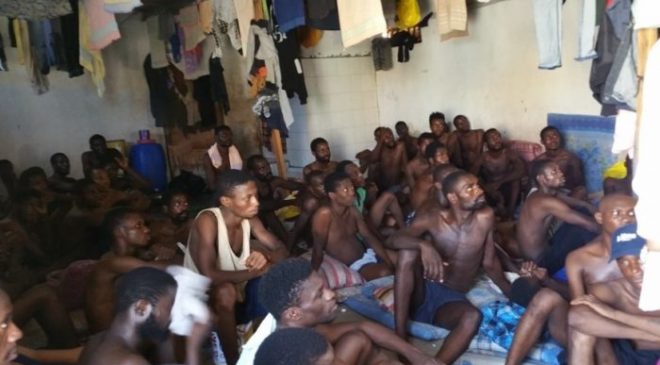
Former detainees now in Tunisia say death of woman in Libya camp is not unexpected considering conditions there. In Tunis, many refugees and migrants camp in front of the offices of the International Organisation for Migration Tunis, Tunisia – Aisha spent months in Tripoli’s Abu Salim detention centre, before eventually making her way to Tunisia.
Originally from Freetown in Sierra Leone, she remembers how bad the conditions were at the site, formerly a notorious high-security prison. Now, sheltering in the shadow of the International Organisation for Migration (IOM) offices in Tunis, along with other refugees living in brightly coloured tents bleached by the sun, she barely reacts to the news that a woman has been filmed dead in Abu Salim.
The video was published by the Guardian on Tuesday, and while the identity of the woman remains unknown, the British newspaper said that Doctors Without Borders (Medecins Sans Frontieres, or MSF) and a United Nations source had confirmed its veracity. The video is believed to have been shot approximately two weeks ago by detainees at the centre.
Aisha described how the guards would regularly force themselves on the centre’s women, sometimes at gunpoint. “A lot of women were raped and got pregnant,” she said. In the end, it proved too much for Aisha and her friends.
Attempting to escape, one was killed by a guard, an act the group were able to capture on video. “The guards killed one of our friends,” she said, “We did the video and said we were going to post it [on social media], so we deleted the video in return for our escape.” Refugees and migrants arriving in Libya are often attempting to leave the country via a boat across the Mediterranean Sea to Europe, or attempting to journey to Tunisia.
The situation in Libya has been unstable since civil war broke out in 2014, leaving rival administrations in different parts of the country, and competing fighting groups. Thousands of refugees have been housed in camps operated by the Directorate for Combating Illegal Migration (DCIM), an organisation headed by a prominent leader of one of the groups, whose existence continues despite promises by the internationally-recognised government in Tripoli to close it.
While abuse of refugees and migrants in Libya has been well-documented by aid agencies and the UN, Libya has remained a key pillar of European efforts to push its internal migration concerns overseas. A controversial deal between Libya and Italy and, by extension, the European Union (EU), to “combat illegal immigration” was renewed earlier this year.
